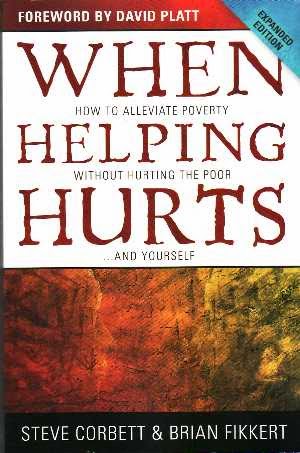
The blurbs on the cover say that this is a ground-breaking book, required reading.
I agree with them!
I learnt so much from this book. Since I lead a social justice team at our church, it is important that I know about what makes aid and charitable programs successful, or not.
Let me share some of it with you.
The quick summary
The authors have both practical and academic experience in assessing aid programs, and are both part of The Chalmers Centre for Economic Development at Covenant College.
They put the good intentions of christian aid, development and charitable organisations under the microscope, and show that many mistakes have been made, and are still being made.
If we want to be good stewards of the wealth entrusted to us (and that shouldn’t really be an “if”!), then there are useful practical lessons here for us to learn.
Six important practical lessons
Why do we care for the poor?
In the past, many evangelical churches placed low priority on caring for the poor, arguing that evangelism is far more important. But the authors argue strongly against this.
They mount a strong Biblical case that Jesus’ mission was making all things new (Rev 21:5) by beginning God’s kingdom on earth. He showed this kingdom by word and deed, and he calls us to do the same. We shouldn’t favour one of these over the other.
4 diagnoses of poverty
If we think the primary cause of poverty is ….
- …. lack of knowledge …. we will educate the poor.
- …. oppression by powerful people …. we will work for social justice.
- …. the personal sins of the poor …. we evangelise and disciple them.
- …. lack of material resources …. we will give them material resources.
4 relationships
People are poor if they are deficient in any of their relationships – with God, self, other people and the creation. Poverty alleviation should address all four.
Types of aid
The authors identify three different situations that may need support, each requiring a different approach:
- If a crisis has occurred, whether in a family or a community, the first step may be relief – emergency help to reduce immediate suffering.
- As soon as “the bleeding stops”, rehabilitation is required – working with people or communities to restore their previous way of living.
- Development is the process of together moving closer to wholeness in all the 4 relationships.
The authors argue that too much christian aid and support stays at simple relief – continuing to provide material support long after the crisis has past, and so not helping the recipients to take initiative in resolving their problems themselves (with a different kind of support).
They say relief should be “seldom, immediate and temporary” – to do more is often doing what people can do for themselves and is paternalistic. Rather we should work with a community (not for them) using an assessment of community strengths and assets as well as needs.
Traps for short term missions
Short term missions have become extremely popular in recent years, and have some very positive aspects, but the authors point out some serious problems:
- In most cases, the community would benefit more from receiving the funding and employing local workers (at lower cost and benefitting the local economy) than having visits by work teams from the first world. Preaching and teaching visits can be paternalistic (the local christians’ circumstances may bring them closer to God, and we may be able to learn more from them) and we would do better to fund the development of local teachers.
- I was most intrigued to learn that different cultures have different concepts of time. Westerners think once time has passed, the opportunity is lost, so we should use every moment. But some third world cultures see time as being always available, so what isn’t done today can be done tomorrow. This can bring tensions between missioners and the community.
- Likewise, western culture is very individualistic while many majority world cultures are more community oriented. So while the short term missionary is eager to pursue the goals they have in mind for their short visit, the community may wish to establish relationships. WE must avoid imposing our culture.
This chapter confirmed for me that short term missions need much better understanding and preparation if they are going to avoid these problems and be genuinely helpful.
Micro finance
Micro finance (providing small, short term, low interest loans to enable poor people to establish a viable small business) has been found to be a very helpful way to break the cycle of poverty and indebtedness. Various forms of micro finance are discussed here, each with its own advantages.
Assessment
This book was nothing less than an eye-opener to me, making me aware of ideas I had never heard before, and confirming some of my half-formed ideas about christian good works.
I feel occasionally that the authors may be a little too tough in their zeal to be efficient and effective, but this is a minor point.
If you are involved in christian good works and/or mission work (as I am), I really think this book is absolutely necessary reading. I can’t recommend it highly enough.
Hi, thanks for the reference. Lots has been discussed regarding this in recent years. Check out Dambisa Moyo
Reblogged this on James' Ramblings.